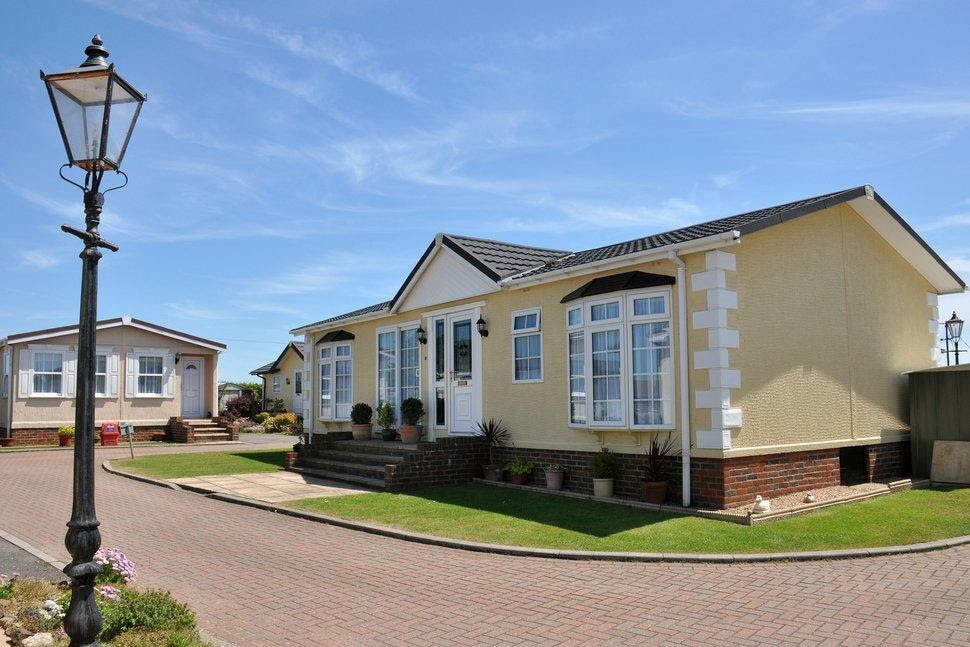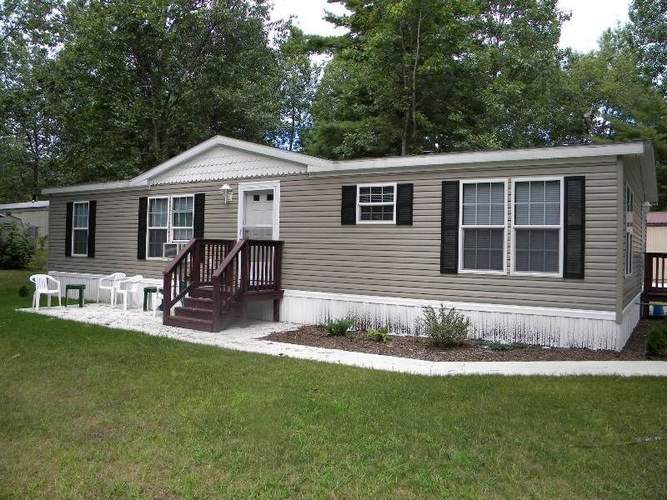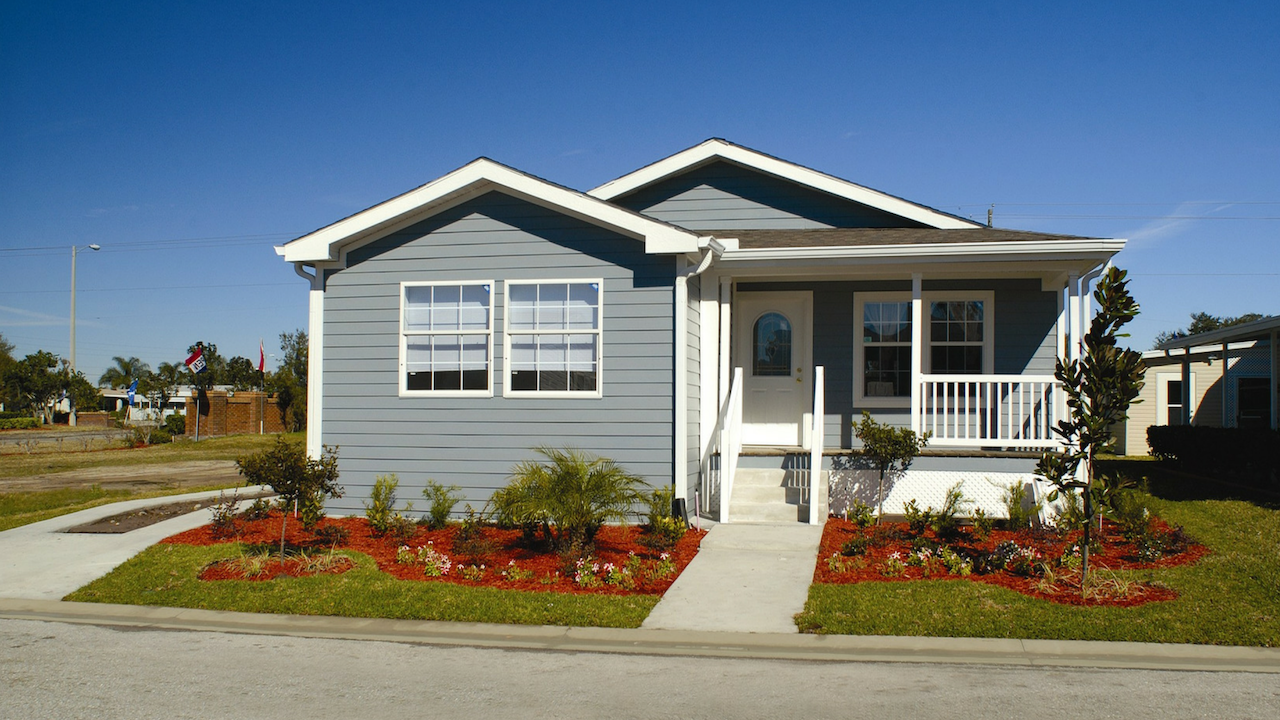Installing new mobile home siding is a great way to increase its value, update your home's look, and make it more energy-efficient. New siding is an excellent investment for old and new homes alike. From wood and stone to metal and vinyl, there are many options to choose from. This article discusses the benefits of installing new mobile home siding, some factors to consider when choosing mobile home siding materials, and what will work the best for your situation.

Related: What Are Property Taxes On Manufactured Homes?
Why You Should Get New Mobile Home Siding
The biggest advantages of installing new siding for your manufactured home include higher curb appeal, better energy efficiency, and protection against outside elements. Siding replacement can be one of the best investments for homeowners, as it yields a high ROI, and the money you put into installing new siding can be recouped easily in resale value and lower energy bills. Here are some ways investing in new mobile home siding can pay off:
It Helps To Lower Heating And Cooling Costs
Perhaps the biggest benefit of new home siding is better energy efficiency. When you upgrade older siding, energy costs can be significantly reduced. However, it's important to keep in mind that certain siding materials offer higher insulating qualities than others. We will discuss which materials have better insulating qualities than others.
Siding increases the R-value of a home, which means that it helps keep the interior's temperature more constant and for a longer period of time. Having a higher R-value prevents your heating and cooling units from working overtime. When you box the home in with extra insulation or foam board and then install new siding, your home's energy efficiency is increased significantly. The additional weight does need to be accounted for, but it's a great option if you aren't planning to move your mobile homes again (which is the case for 90% of all manufactured homes). If you choose heavier siding options such as brick, fiber cement, or real wood, you may need additional blocking of the foundation to balance the added weight. The money saved on heating and cooling costs typically balances out these additional costs, however.
Protection From Noise, Wind, and Animals
New siding can help protect your family from unwanted noise. Noisy neighbors are annoying, especially in a mobile home or nearby. New siding, especially paired with upgraded windows and insulation, can reduce noise levels in your home significantly. For homes in parks that are closely spaced, this is an especially vital factor. Of course, noise may not be the only unwelcome guest invading your home. Upgraded mobile home siding also offers better pest control, as it provides an extra layer of protection from creatures such as opossums, mice, snakes, and other small pests. Moreover, the installation process helps repair any cracks and holes and offers an additional layer of material to secure your home from external factors. Better siding also fights moisture, preventing the growth of dust mites, mold, and bacteria, as long as there is proper ventilation installed with the siding.
Better Curb Appeal
New siding can upgrade a home's curb appeal- you can shave years off your home and give your home a totally different look with a single project.
Related: What Is The Difference Between a Mobile Home, Manufactured Home, Trailer, and RV?

Popular Mobile Home Siding Options
Choosing the siding material that best suits your budget, aesthetic, and overall needs can be a difficult decision since there are so many color and material options! Here are some of the most popular mobile home siding materials:
Vinyl
More than 30% of all new homes use vinyl siding, making it a top siding option for mobile homes and site-built homes alike. Vinyl is a top choice since it is affordable, long-lasting, and aesthetically pleasing. Vinyl siding is also easier to install compared to other kinds of siding. Most manufactured homes feature recycled vinyl siding, which is cheaper and thinner than virgin vinyl and needs to be replaced every few years. New vinyl siding typically lasts twice as long, making it a good investment. It's recommended to shell out a bit more for thicker virgin vinyl if you're replacing siding on your mobile home or ordering a new home since it will last you a bit longer.
Looking for new or used mobile homes? Buy from Home Nation today!
-
Vinyl Mobile Home Siding Pros:
-
Easy to clean
-
Resistant to scratches and dents
-
No paint requires
-
Long-lasting
-
Weather-resistant
-
Lightweight
-
Resistant to insects, mildew, and fungus
-
Various color available
-
Vinyl Mobile Home Siding Cons:
-
Synthetic look
-
Can crack in cold climates
-
Can warp in high heat
Wood
While wood is gorgeous, it calls for more attention than other kinds of mobile home siding materials. However, the traditional look and warmth are hard to beat. Wood is a good option for manufactured home siding, but watch out for problems such as water damage, rot, and additional maintenance costs.
T1-11
T1-11 comes in two grades- OSB, a cheaper grade made from different smaller pieces of wood glued and formed into grooved sheets. OSB T1-11 is a rougher material and is more difficult to stain or paint. Plywood is a type of wood sheeting formed from larger wood pieces glued and formed into grooved sheets. Plywood is more expensive but is smoother and is generally the preferred option for mobile home siding since it is easier to sand and seal with stain or paint. T-11 panels are versatile and can be installed horizontally or vertically, but vertical installation is generally the best choice to minimize water damage.
-
Wood & T1-11 Mobile Home Siding Pros:
-
Adds aesthetic appeal
-
Easy to install and shape
-
Environmentally-friendly
-
Wood & T1-11 Mobile Home Siding Cons:
-
More expensive
-
Requires frequent maintenance
-
Needs regular caulking and painting
-
Flammable
-
Susceptible to damage
Cedar
Cedar is a timeless option that fits with any home, from traditional to contemporary. Cedar siding comes in shake, bevel, lap, log cabin cut, regular board and batten, tongue and groove, and a few other specialty shapes. Cedar offers the added bonus of natural insect repulsion, along with moisture and decay resistance.
-
Cedar Mobile Home Siding Pros:
-
Naturally repels insects
-
Resistant to moisture and decay
-
Doesn’t require paint
-
Works well in hot and cold climates
-
Tough and durable
-
Cedar Mobile Home Siding Cons:
-
Quite expensive
-
Flammable
-
Environmental conditions can negatively affect it
Faux Stone
Also known as cultured stone veneers or architectural stone, faux stone siding adds dimension and permanency to any mobile home. Faux stone can be on the expensive side, but it adds to resale value.
-
Faux Stone Mobile Home Siding Pros:
-
Offers a nice, unique look
-
Resistant to rot and insects
-
Water-resistant
-
Energy-efficient
-
Long warranties
-
Faux Stone Mobile Home Siding Cons:
-
Requires expert installation
-
Improper installation can cause structural damage and water leaks
-
More expensive than other options
Fiber Cement
Fiber cement siding comes in a broad array of boards, thicknesses, and styles. It can be made to look like pretty much any siding on the market, such as cedar shark or vinyl, and is rot and insect resistant.
-
Fiber Cement Mobile Home Siding Pros:
-
Highly versatile
-
Long-lasting and durable
-
Fire-resistant
-
Ideal for areas with heavy storms
-
Fiber Cement Mobile Home Siding Cons:
-
Heavy
-
Installation is difficult
-
High labor costs for installation
-
Requires regular painting
Metal Siding
Metal siding is one of the most common types of siding for mobile and manufactured homes and has been the most popular kind of siding for mobile homes until vinyl siding came along. Lightweight and almost indestructible, metal siding is insect-proof and fire-proof. However, you do have to watch out for dents and scratches.
-
Metal Siding Mobile Home Siding Pros:
-
Lightweight and easy to install
-
Insect-proof
-
Fire-resistance
-
Energy-efficient
-
Durable
-
Metal Siding Mobile Home Siding Cons:
-
Easily scratches and dents
-
Fades over time
-
Metallic appearance that can be unappealing
Related: How to Winterize a Mobile Home: The Ultimate Guide for Beginners
Mobile Home Siding Installation
Once you’ve chosen the material for your new mobile home siding, you’ll need to install it. While we recommend hiring a professional contractor, you can do it yourself—and we have some tips for you if you decide to go that route:
-
Prepare the area. The first thing you’ll want to do is declutter your walls of any existing caulk and siding. Next, you’ll need to remove any peripheral installations (like gutters and lightbulbs) to give yourself more room for the renovation. Finally, we recommend adding an extra insulation layer before putting up the new siding; this will help make your mobile home more energy efficient.
-
Install the corner posts. You can also update the look of your mobile home when installing new siding by using corner posts. However, before you do, you’ll want to measure and cut a ½ inch gap between the top of the corner post and the roof. Then, you can anchor the post using a nail every foot.
-
Trace a chalk line. If you want your new mobile home siding to look perfect and achieve uniformity, you’ll want to trace a straight line across the length of your home. Drawing that line will help you install the wall cladding fast and properly. Then, you can install your starter strip and nail the siding onto the wall, but you’ll want to leave a ¼ inch gap between each panel to hide the cuts you made.
Install the trim. Finally, after your siding is up, you’ll want to install the trim around your doors and windows. You’ll get the best results using a miter saw. And here’s a pro tip: keep your trim wider than your windows for a better look and better function.
New siding can be a great investment for your mobile home since it not only updates your home but can make your home more energy-efficient. If you're looking for an affordable mobile home, Home Nation offers new and used single and double-wide mobile homes at top prices. Get your new home with Home Nation!

Looking for new or used mobile homes? Buy from Home Nation today!





